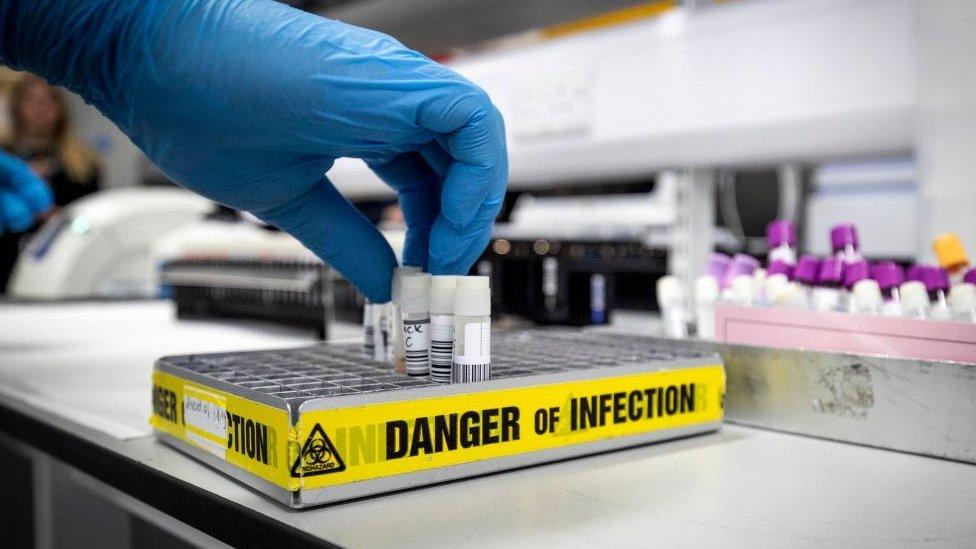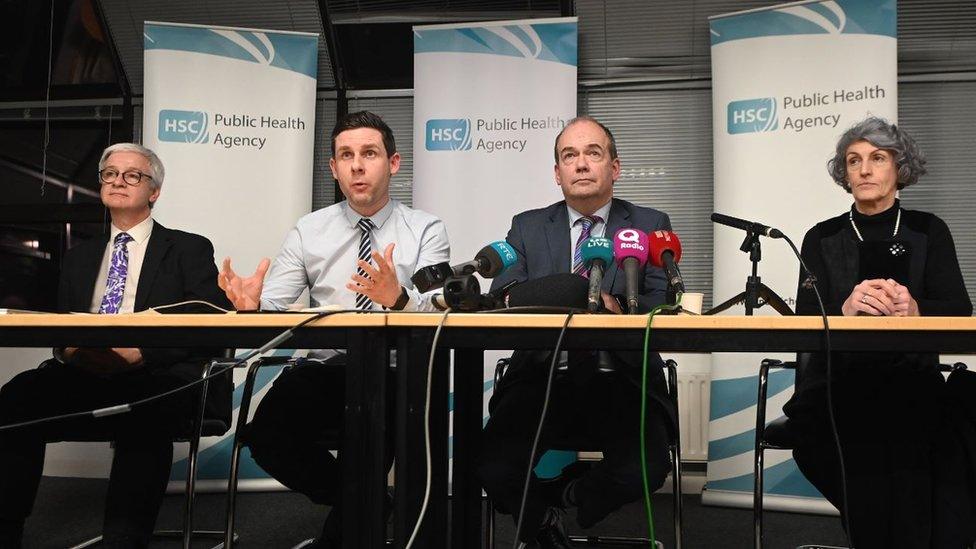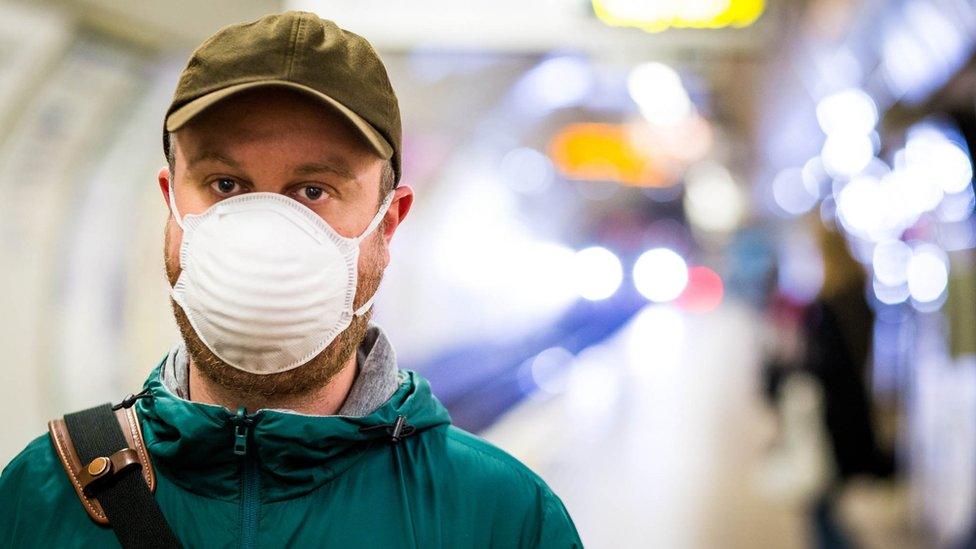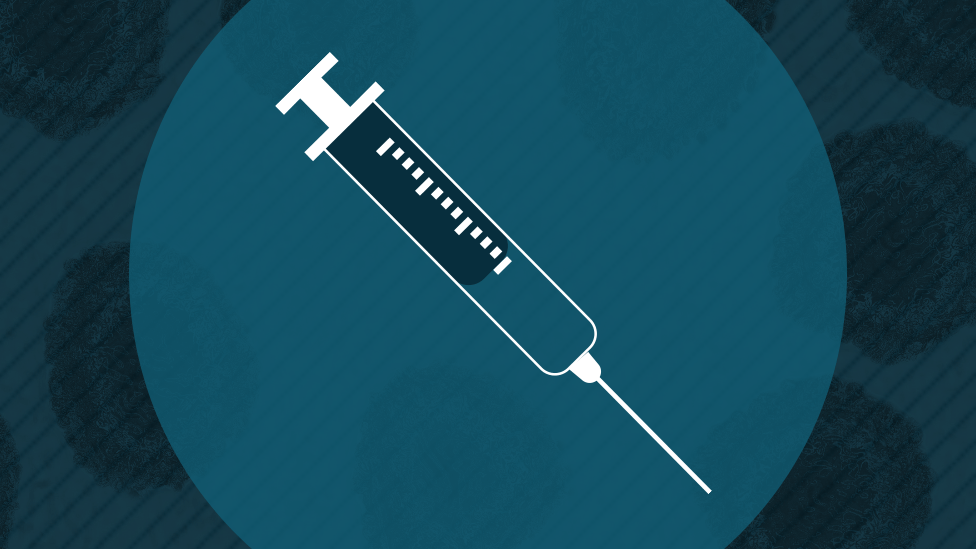Coronavirus: First case confirmed in Northern Ireland
- Published

The patient has shown a presumptive positive result for Covid-19, the respiratory disease caused by the virus
The first case of coronavirus in Northern Ireland has been confirmed, the Public Health Agency has said.
Chief medical officer Dr Michael McBride said the adult had travelled from northern Italy via Dublin.
He said the patient had contacted a GP and had taken steps to self-isolate.
The BBC understands the patient is a woman and she travelled with a child to NI from Dublin in the last 36 hours. It is believed the child is not in hospital but is awaiting test results.
Dr McBride said the patient had shown a presumptive positive result for Covid-19, the respiratory disease caused by the virus, and the test outcome was being verified by laboratories in England.
"Our health service is well used to dealing with such infections and I want to reassure the public that we are prepared," Dr McBride said.
"The risk to the population of NI has not changed as a result of this presumptive positive test result."
For advice and the latest updates on the coronavirus outbreak, the Public Health Agency has a dedicated website, external.

Health officials made the announcement at a press conference on Thursday evening
The patient is receiving specialist care and public health staff were "working rapidly" to identify anyone the patient came into contact with to prevent a further spread, he added.
He said those with casual passing contact should not be concerned.
Dr McBride said the case was specifically linked to travel but the patient had not been on a school trip.
No further details about the patient have been released and it is not known if they used public transport to get to Northern Ireland.
Italy has become a major centre of infection and now has more than 500 cases of coronavirus.
BBC NI health correspondent Marie-Louise Connolly said any confirmed case would likely be taken to an isolation unit in Belfast's Royal Victoria Hospital, which was activated on Thursday.
"In order to protect the individual's privacy, the Department of Health will not confirm where the patient is being cared for, or their condition, only that they are receiving specialist care," she added.
'Patient self-isolated while awaiting results'
Speaking on RTÉ's Prime Time, the Republic of Ireland's chief medical officer Dr Tony Holohan said the health authorities had been preparing for this eventuality and it showed the guidelines were working.
He said officials would be making contact with passengers who sat within two rows of the individual on the plane from Italy to Dublin.
On Wednesday, the PHA said 52 people had been tested for the coronavirus and all the results were negative.
Earlier on Thursday, two more patients tested positive for coronavirus in England, which means the total of UK cases now stands at 16.
Also on Thursday, the World Health Organization warned the outbreak had reached a "decisive point" and had "pandemic potential".
Globally, more than 80,000 people in more than 40 countries have now been infected and Covid-19 has killed more than 2,700 people.
Most of the deaths have been in China, where the virus originated in December.

What you need to know about coronavirus
What are the symptoms?
The main signs of infection are fever (high temperature) and a cough as well as shortness of breath and breathing difficulties.
What should I do?
Frequent handwashing with soap or gel, avoiding close contact with people who are ill and not touching your eyes, nose and mouth with unwashed hands can help cut the risk of infection.
Catching coughs and sneezes in a tissue, binning it and washing your hands can minimise the risk of spreading disease.
Anyone experiencing symptoms, even if mild, after travelling from mainland China, Thailand, Japan, Republic of Korea, Hong Kong, Taiwan, Singapore, Malaysia or Macau, is advised to stay indoors and call the NHS 111 phone service.
What is the government doing?
The main focus is on rapidly identifying people with the disease and taking them to specialist hospitals for treatment in isolation.
They are then tracing anybody who has come into close contact with the patient to make sure they know the signs of the disease and what to do.

- Published23 March 2020

- Published6 October 2021

- Published28 May 2021
